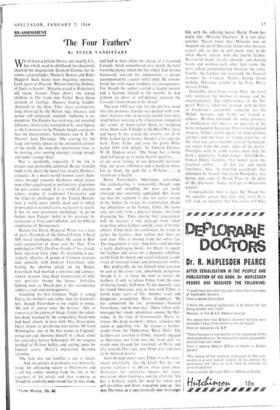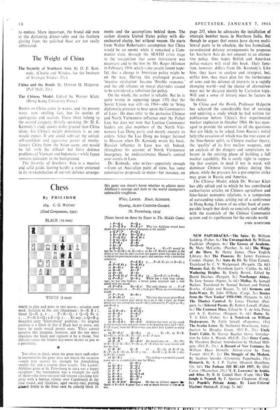RE-ASSESSMENT
'The Four Feathers'
By PETER V ANSITTART
WE all have a private library, not exactly Lit., but which, read in childhood, has decisively shocked the imagination. Graham Greene, for in- stance, acknowledges Marjorie Buwen and Rider Haggard. Such books have beguiling openings. Look again at Dracula. Watson meeting Holmes, A Study in Scarlet: Mazarin seated in Richelieu's old room, Twenty Years After: the scared children in The Light that Failed. Beau Geste accused of stealing: Hannay finding Scudder skewered to the floor. They share assumptions long shattered by the Belsen Age. Decency and justice will ultimately triumph. Suffering is re- demption. The Empire has civilising and merciful influence, historically exemplified by such figures as the Lawrences in the Punjab. Jungle and desert lure the Quatermains, Arbuthnots and A. E. W. Mason's Jack Durrance. 'The craving for the large and lonely spaces in the outlandish corners of the world, the incurable intermittent fever to be moving, ever moving amongst strange people and under strange skies.'
War is justifiable, especially if the foe is weaker and, preferably, coloured. Beauty (female) tends to be above the moral law, despite Holmes's strictures. In a man's world women assert them- selves through romantic bitchiness which leaves men either goggle-eyed or perfunctory, glad when the port comes round. It is a world of absolute values, residue of traditional Christianity and the either-or challenges of the French Revolu- tion; a world never wholly dead and to which in personal or national crises we hasten to return. It has its own passionate mythology, to go no further than Patton's belief in his previous in- carnations at Troy and Culloden, and the biblical simplicities of Montgomery.
Mason, like Doyle, Haggard, Wren, was a man of parts. President of the Oxford Union, Liberal MP, naval intelligence officer. He acted in Ben- son's production of Arms and the Man. First published in 1902, The Four Feathers* has already been reprinted forty times. Its beginning is par- ticularly effective. A group of Crimean veterans dine annually with General Feversham, cele- brating the abortive attack on the Redan. Feversham had married a sensitive and compas- sionate woman, long dead. Generations of mili- tary portraits throng the house: first-class fighting men, as Mason puts it, but second-class soldiers, cruel and unimaginative.
Attending his first Crimean Night is young Harry, his mother's son rather than the General's heir, though Feversham is too stupid to notice. 'He will of course enter the Service.' This of course is at the centre of things. Under the relent- less dead, watched by the sympathetic Sutch who had been silently in love with Mrs. Feversham, Harry listens to paralysing war-stories. Of Lord Wilmington, -one of the best names in England,' ostracised and shooting himself in a back street for cowardice before Sebastopol. Of the surgeon terrified of Pathan bullets and cutting open his femoral artery. Harry's expression becomes alarming.
'The look was too familiar a one to Stitch.
. . And one picture in particular rose before his mind. An advancing square at Inkermann and a tall big soldier rushing from the line in the eagerness of his attack and then stopping as though he suddenly understood that he was alone,
*John Murray, 12s. 6d. and had to meet alone the charge of a mounted Cossack. Sutch remembered very clearly the fatal wavering glance which the big soldier had thrown backwards towards his companions—a glance accompanied by a queer sickly smile. He remem- bered too with equal vividness its consequences. For though the soldier carried a loaded musket and a bayonet locked to the muzzle, he had without an effort of self-defence received the Cossack's lance-thrust in his throat.'
The year 1902 was ripe for the anti-war novel that this promises. Europe was packed with arm- chair warriors who in practice would have hesi- tated before swatting a fly. Chesterton trumpeted the virtues of Inquisitorial Spain in swingeing verse. Shaw said. 'I delight in the [Boer] War more and more. It has waked the country out of its filthy wallowing in money; blood is a far superior bath.' Ernst Toiler and even the gentle Rilke hailed 1914 with delight. To Edward Thomas, W. H. Hudson wrote, 'The blood that is being shed will purge us of many hateful qualities . . . of our caste feeling, of our detestable partisan- ship, our gross selfishness and a hundred more. Let us thank the gods for a Wilhelm . . . to restore us to health.'
Harry Feversham's inheritance, cowardice, like card-cheating, is inexcusable, though rape, murder and swindling the poor are easily tolerated and sometimes applauded. But, learn- ing that his regiment is due for active service in the Sudan, he resigns his commission, plead- ing obligations to his fiancée, Ethne. He seems safe, not only from a physical danger. but from disgracing her. Then, during their engagement ball, he receives a tiny package from which drop three white feathers sent by a trio of brother officers. Ethne hears his confession, he stoops to gather the feathers, then realises that there are now four. One is missing from her white fan. The engagement is over. And here could develop a really challenging book : for Harry to accept the feathers and carve out a dynamic rebellious world from his moral and social isolation, a sub- strata of reversed values and provocative misfits.
But, predictably, he sets himself what can now be seen as the easier task, abnormally dangerous though it is: to force the men to retract the feathers, if only to relieve Ethne from the onus of having loved a half-man. To die decently, says his friend Durrance, also in love with Ethne, is worth many years of life. Another stock and dangerous assumption. Harry disappears. 'He has committed the sin,' pronounces General Feversham, 'and he must pay.' There follow well- managed but simple adventures among the Der- vishes, in the style of Greennzatztle. Harry re- trieves the dead Gordon's letters, valueless but taken at appalling risk : he rescues a feather- sender from the Omdurman 'Black Hole.' The feathers are returned to Ethne, recently engaged to Durrance. not from love but from guilt to- wards men through her treatment of Harry and pity towards Durrance, now blind after exposure in his beloved deserts.
Seen through men's eyes, Ethne is to be rever- enced uncritically, like the Grail. For her 'en- gaging frankne s' (a phrase often used about Bismarck), her sensitivity, beauty. her vague mysticism about loneliness and the after-life. She has a barbaric touch, her need for music and self-discipline and brute masculine courage. She sees Durrance as a supernaturally-sent messenger link with the suffering heroic Harry. From her violin (the 'Melusine Overture.' It is not clear whether Mason knew that Melusine was an Angevin she-devil) Durrance learns what his eyes cannot tell, so that he will know what to do when Harry returns with the fourth feather. Woosterish manly loyalty abounds, and shaking hands and wishing each other luck seems the most telling communication between the sexes. Finally, the feathers are exorcised, the General resumes the Crimean Nights. having learnt nothing, Durrance returns to the East, Harry marries Ethne.
Ostensibly about Love versus Duty, the novel only reinforces the mistrust of instinct and the unconventional. The righteousness of the Im- perial Wars is taken for granted, with no hint of Gladstone's reasonable sympathy for the Mahdi. Servants and Arabs are treated as ciphers: Ibrahim befriends the white prisoners at Omdurman. but there is no question of his being included in the escape. There is banal period imagery. Ethnes violin speaks of 'long perilous journeys and the faces of strange countries: of the silver way across moonlit seas; of the beckon- ing voices from the under edges of the desert.' Nostalgia, with its stable values, must help the book's popularity. Faded names: Tel-el-Kebir, Osman Digna. Gordon. 'that honest great im- practical soldier . . . of few ties and much loneliness.' Also, 'he travelled accordingly that afternoon by branch lines from Hampshire into Surrey and came to Broad Place in the glow of the afternoon.' Today he'd get to Khartoum quicker.
Condescension, then, is easy; but Mason has the supreme answer that after sixty years he is still read, an indignity that few critics will have
Air AP" AV Air ASS' AT Arr Afr Air Air to endure. More important, the brutal old men at the darkening dinner-table and the feathers glaring from the polished floor are not easily obliterated.































 Previous page
Previous page